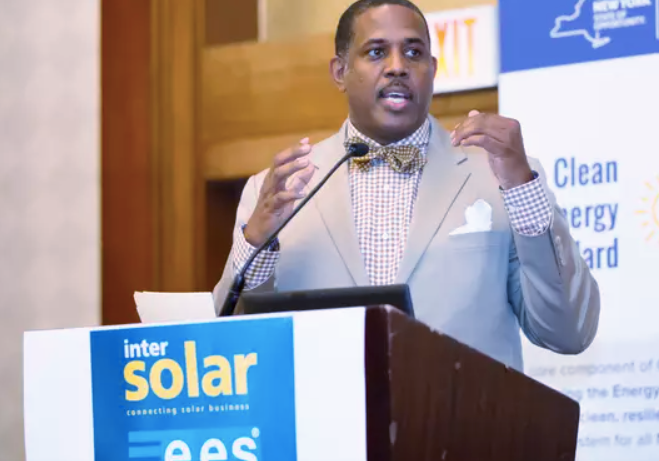The Brooklyn state senator is looking to trade a senior perch in the Democratic conference in Albany for the city’s No. 3 post.

NYS Senate
Kevin Parker, a Democrat, has represented Brooklyn’s 21st district in the State Senate since 2003.
Thirteen days into the 2021 legislative session in Albany, Sen. Kevin Parker already has 10 pieces of legislation in the pipeline. One, to pave the way for educational opportunity centers on SUNY campuses, has already passed the Senate. Two others, concerning pre-paid phone cards and a health literacy task force, are on the floor calendar. The rest, which include a ban on public investments with the Trump organization and stricter requirements of mortgagors who foreclose, await action sometime during the 2021-2022 term.
If things work out for Parker, however, he might not be there to see those bills meet final success or failure. A senator since 2003 and now the majority whip, Parker is one of four Democrats vying for the office of city comptroller. And, like fellow candidates Sen. Brian Benjamin Assemblymember David Weprin, Parker would resign his Albany post to take the job. (The fourth candidate, Councilmember Brad Lander, is term-limited.)
Parker joined a special Max & Murphy podcast edition on Tuesday to discuss his candidacy for one of the city’s most important offices. Comptrollers oversee the city’s nearly $90 billion budget, register tens of thousands of city contracts, audit city agencies, manage the $225 billion in pension funds, handle the city’s debt, propose policy and make key economic projections. They also tend to run for mayor.
Given the financial issues facing the city, 2021 comptroller candidates are being asked whether New York was ill-prepared for the economic shock that COVID-19 delivered. The budget grew about $20 billion between 2013—Mayor Michael Bloomberg’s last year in office—and 2019; it had grown some $13 billion over the previous seven years.
“There was no way to really prepare for this pandemic: This is, like, a once-in-a-century type phenomenon. So I thought the city was as prepared as it could have been for any kind of major event,” Parker said. “And when you look at the financial health of the city, it’s not spectacular, but it’s certainly not so earth-shattering that we can’t figure it out. We’re in a position that we can figure it out.”
In addition to new federal aid, Parker assumes tax increases on the very wealthy and new revenue from taxes on cannabis and on sports gambling will be part of the mix. He cautions, “We’re not going to tax our way out of this situation. We’re really going to need to grow out of it and it’s really through creating full-time jobs with living wages and benefits … and so it’s small business development.” He says a major focus of his comptrollership would be getting more small businesses access to capital and technical assistance.
There might be creative ways to use the city’s contracting power and mighty pension funds to make those kinds of investments. The next comptroller will also oversee the city’s move away from other types of investments, like in stocks related to fossil fuels. It’s possible the next comptroller will be pressed to move to divest from other sectors as well. Parker outlined how he would approach those choices.
“When it comes to the pension fund, if it doesn’t make dollars, it doesn’t make sense. The first job is to make money for the pensioners and to make sure we don’t have to go to the taxpayers to pay pensions. That’s the first job,” he said. “But I don’t think that’s mutually exclusive with creating a pension fund that reflects the values of the city of New York and of the pensioners themselves, who want to see a better world.” For instance, investing in green jobs makes policy sense for the city and fiduciary sense for the funds, he said.
Hear the rest of our conversation below.









